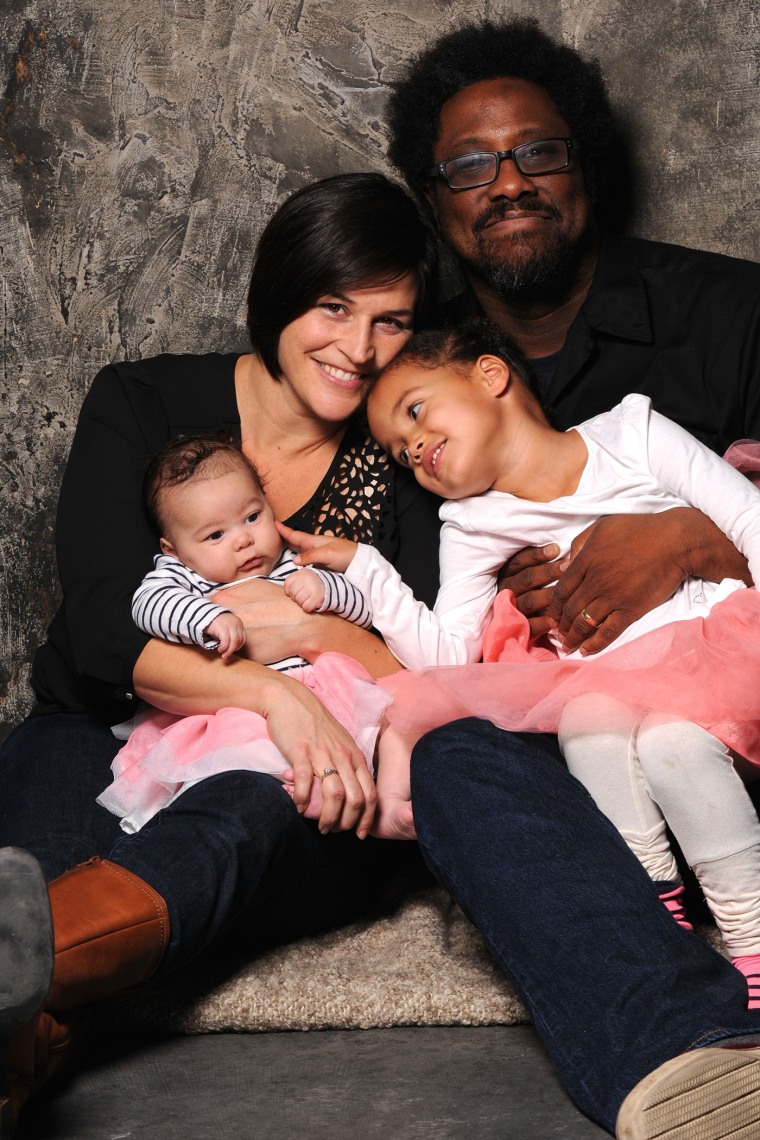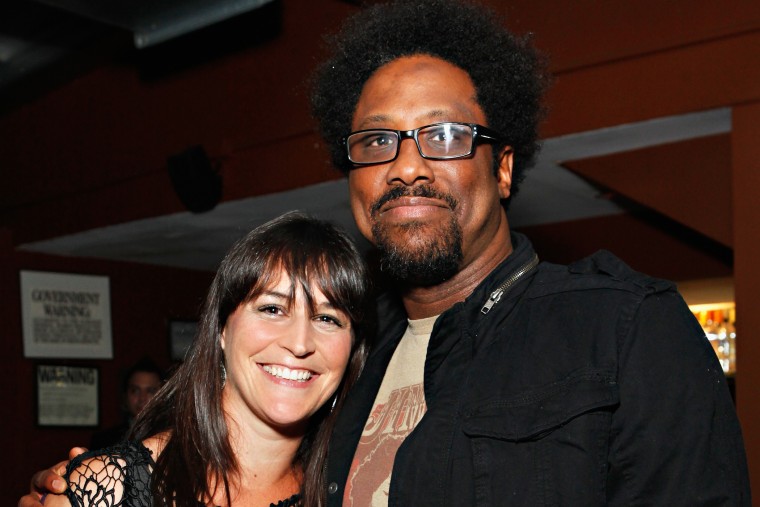If there’s one thing we can all agree on, politics aside, it’s that love transcends all. In celebration of Valentine’s Day, msnbc.com’s “Love is Love” series will profile a variety of couples and their stories in the week leading up to February 14 to show that “love is love,” no matter your race, nationality, sexual orientation, disability or gender identity.
W. Kamau Bell is a comedian who has become famous for his no-holds-barred approach to tackling race, politics, and social issues in his comedy. He also hosted the late night comedy show "Totally Biased with W. Kamau Bell," which aired on FX. Kamau has frequently spoken out about the role race and racism play in American society, entertainment, media, and politics. Here, he and his wife, Melissa Hudson Bell, talk to msnbc about race, love, interracial relationships, marriage, and raising a family.

Names: Dr. Melissa Hudson Bell, Ph.D., and W. Kamau Bell
Been together for: We have been together since April Fool’s Day 2003. And we’ve been married since 2009 … And, yes, Kamau just had to look that up on Facebook.
How did you meet? I [Kamau] was directing a one person show that starred a good friend of Melissa’s. Her friend, Jill, hired Melissa to run the tech booth. Jill had described Melissa to me as a college student, and she had described me to Melissa as a theater director. (I was mostly just a struggling comedian.) So when we met, we were both surprised. I expected a 19-year-old college co-ed. Melissa was a grad student. And Melissa expected some older, grizzled theater director. I was a “fresh-faced” up-and-coming comic with dreadlocks in pigtails.
How did your friends and family react to your relationship in the beginning and now?
We met in the San Francisco Bay Area, which doesn’t mean that everybody around us was cool with interracial relationships but those who weren’t were certainly in the — gratefully, mostly silent — minority. Our circle of friends had absolutely no problems or issues with our relationship. If anything, we have the kind of friends who openly engage in conversations about the specific challenges that the outside world puts on any relationship that is not two, cisgendered, white, heterosexual Americans of slightly more than average height and slightly under the average weight.
There were, however, elder members of our family that were stuck in old-school beliefs that the races shouldn’t intermix. The awkward conversations we had to have, and re-have, and re-re-have around these beliefs were hard and painful, and they took a serious toll on our relationship. It took us years to move through them to the amazing blended family we now are. But if we hadn’t stuck it out through all of that, then we wouldn’t have our two daughters, who are the smartest, funniest, most amazing people on the planet in the history of everything. But then maybe we are totally biased.
Kamau, you have talked in your shows about the landmark Supreme Court case Loving v. Virginia, which struck down laws banning interracial marriages in 1967. Since then, there are more interracial couples than ever, but public attitudes towards interracial couples haven't always completely caught up. What do you say to people who might not understand your relationship? What do you wish people knew about your relationship?
This is a frustrating question, because, on the one hand, it’s not for anybody to understand my relationship — just like people in those white-on-white (or black-on-black) relationships don’t feel any pressure to explain their couplings. If you don’t think it is okay for the races to intermix (or the sexes or genders or religions) then I really don’t know what to say to you other than "turn off your TV and try not to go outside too often if you live in a major city or near a big college campus."
The “work” we have done with family is about reaching out to people who we know have love in their heart but just never envisioned this kind of family. If you are that kind of person, then I would say that you need to understand that from my perspective that anytime two people decide to bring their separate lives together for the purposes of forming a new family unit, that is a challenge. It is a challenge just from the standpoint of reasons that we are all familiar with … “Where do we spend the holidays?” … “Who gets to choose what color we paint our walls?” “Why can’t I leave my socks everywhere around the house anymore? I’ve done that my entire life!!!” But these are internal challenges. When you apply pressure to the relationship from the outside world, well, then you are just making a difficult challenge infinitely more difficult for no good reason … like a reality show. Why would you want to do that?
I would also ask that people not make assumptions about any relationship that they are not intimately involved in, because of the fact that you’re not actually, like, in the relationship so how would you know, like, anything about it.
In your stand-up shows in San Francisco a few years ago, you used to offer a discount to people who brought a friend or date of a different race. What was your thinking behind that promotion?
In my mind, the only way to truly get to the end of racism is to get everybody in the room at the same time so that we can have these awkward conversations that many of us normally try to avoid. So that offer at my show was my way to guarantee that the audience wouldn’t be just be predominately one racial group, no matter where the theater was located. It also got people thinking about race before they walked in the door. For me, that was necessary in doing a show about race and racism mostly because, in my experience, white people don’t think about their whiteness nearly enough. Also I thought it would force people to think about who is in their immediate circle of friends. If you can’t find a friend of a different race to bring to the show then maybe you should think about why that is. Also as a person who is in an interracial relationship, it is a sneaky way to let those couples know that this is a safe supportive space. In comedy spaces, I have found that, overwhelmingly, interracial couples are generally the butt of easy jokes. I wanted to redefine that idea in a comedy context.
Last month, you wrote about an incident at a restaurant where you were together and a server mistook Kamau for a panhandler while he was talking to his wife and her friends, who were white. The incident has generated outrage on social media, and there will soon be a public forum to discuss what happened at the restaurant. What do you want people to learn from the events that took place there? What’s your message?
What I think we want people to take away from all this is twofold. It is twofold because it really involves two different perspectives on racism in America. The first thing is for white people who are currently sitting on the fence about the subject of racism in America. We want them to get off the fence and accept that racism is still alive and thriving in this country — despite the election of a black president and the fact that a black woman owns three hours of prime-time television on Thursday nights. We want those people to accept that painful truth and roll up their sleeves and commit to making the country a more friendly place for people of color.
Secondly, we want people of color to know that we are personally committed to making the world a better place, not just for our family but for people of color everywhere and also for other families that look like ours. I have personally been frustrated when people of color who have high profiles seemed to shy away from talking about the racism that they have experienced in their lives, so we felt that we had to say something when the incident went down at The Elmwood Cafe. Also we believe in the power of the awkward conversation to initiate change in people’s lives. We didn’t call for a boycott. We didn’t cal for anyone to get fired. (Although the owner decided to fire the employee that he felt was at fault.) We called for and will have a public conversation that will be open to the community and involve community leaders and members of the community to talk about their experiences of racism in the Bay Area. Since this went down, I have received emails and Facebook messages and tweets from people who have had similar treatment and worse from Bay Area businesses. And since the Bay Area is allegedly the most progressive place in the country, and since we choose to live there, we want to be part of a positive change.
You have two young daughters. How do you both talk to your kids about race and interracial families?
Since we first began reading books to our oldest daughter, we read not only the usual suspects from our childhood (Shel Silverstein, Dr. Suess), we also read books to her that are about families like ours. Selina Alko has an awesome book called “I’m Your Peanut Butter Big Brother” that’s about how some families have members with different skin colors. Karen Katz has an equally awesome book called “The Colors of Us.” Obviously this isn’t enough, but it is the start of what will inevitably be a lifetime-long conversation about race and racism. We also celebrate both of our individual family traditions, which means around Christmas we do crab cioppino because of Melissa’s Italian heritage, and we do Kwanzaa because that is how Kamau was raised. Yup, he is a part of the 1% of African-Americans who actually celebrate Kwanzaa.
What’s something you’ve learned from each other and from your relationship?
One thing we have learned is that committing to a marriage takes more flexibility, more creativity, more humor, more forgiveness, more compassion, and many more pints of late night ice cream than we ever imagined. It's hard. Period. But it's that same hard stuff that has revealed the infinitely interesting depths of really loving someone as they are. And we know that sounds like the longest Hallmark card ever but it also happens to be true.
What's something you find surprising or intriguing about your partner?
Something surprising about Kamau is that when he is not on the road, he insists on cooking a giant breakfast for our daughter and packing her an interesting lunch for school. The surprise is not that he would pull an awesome dad move like that, but rather that the guy who literally eats the same bowl of granola every morning would be so thoughtful about food.
Melissa is great at reminding me of the principles that I stand for when I sometimes want to forget them because things feel too hard. Also she has improved many of my jokes.
And lastly, just for fun: How will you two be celebrating Valentine's Day?
Because showbiz hates families, we will be in separate cities on Valentine’s Day. Kamau will be on the road working, and Melissa will be at her parent’s house with our daughters. But we have decided to watch "Boyhood" together on each of our computers at the same time, over the phone, just like two teenagers … from the future.
